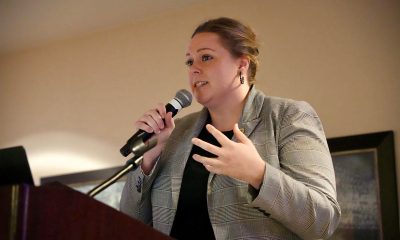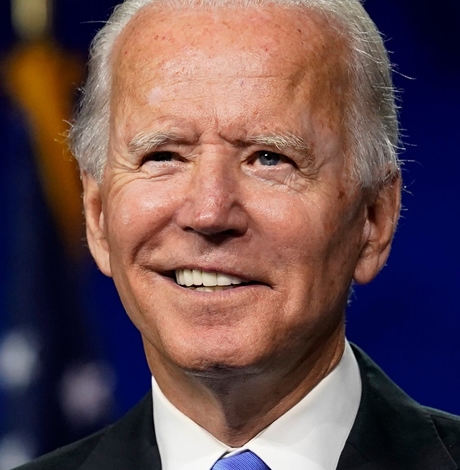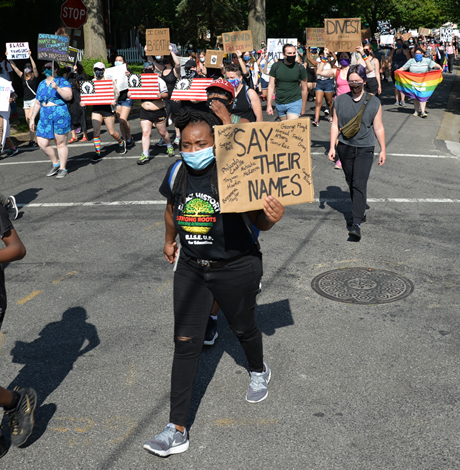National
U.S. agency seeks to cut LGBTQ protections in union contract talks
NLRB denies meeting with employees concern about anti-LGBTQ move


The National Labor Relations Board is seeking under the Trump administration to axe LGBTQ non-discrimination language — as well as protections based on race, sex and religion — from its union contract with professional attorneys within the U.S. agency as part of collective-bargaining negotiations, according to union representatives.
The union, known as the National Labor Relations Board Professional Association, is made up of about 120 attorneys at the NLRB headquarters in D.C.
“They’re taking it all out,” one NLRBPA member said. “They’re basically saying it’s duplicative, it’s covered by statute, so we don’t want to do anything through grievance and arbitration. If you think there is discrimination, then you need to a file complaint with the EEOC.”
The NLRBPA is pleading with Rep. Jamie Raskin (D-Md.) and Sen. Dianne Feinstein (D-Calif.) to step in and urge the agency to keep those non-discrimination protections in place within the union contract. Individually, LGBTQ employees with concerns over removal of the non-discrimination protections also sought to meet with management on the issue, but were rebuffed, union members told the Washington Blade.
For the time being, NLRB is required to maintain the non-discrimination protections from the previous contract, even though that contract expired last year. But that situation is expected to change soon. As a result of executive orders signed by President Trump last year, federal employee unions are required to engage in negotiations with their respective agencies to form new contracts.
In a pair of letters dated March 5, the NLRPA calls on Raskin and Feinstein to engage in oversight of the agency as it seeks to eliminate those non-discrimination protections. One letter calls the proposal “a giant step backward in the fight to ensure that LGBTQ workers receive equal treatment under the law.”
“It is a mark of shame that employment discrimination against LGBTQ employees, including federal employees, has been tolerated for so long, and to callously take any protections away after so long a struggle for equal treatment would be unconscionable,” one letter says. “In that spirit, we would be most grateful for any oversight of the agency and help that you can provide to defend the workplace rights of our LGBTQ brothers and sisters.”
The letters also express other concerns. Among them is NLRB proposing to eliminate a standing joint labor-management Equal Employment Opportunity Committee, a reversal the union says turns “historically a cooperative relationship between management and the union into an adversarial relationship.” The NLRB also proposes to undercut the grievance and arbitration system in other ways, the letter says.
Raskin, in a statement to the Blade responding to the letter, said NLRB’s proposed removal of LGBTQ protections is unjust, especially from a U.S. agency charged with enforcing federal labor law.
“Trump’s administration has tried from the start to purge all mention of LGBTQ rights from federal law and policy,” Raskin said. “Now, by proposing to eliminate protections for LGBTQ employees from its collective bargaining agreements, the NLRB — which is supposed to be a leader for workplace fairness—becomes the latest perpetrator of the administration’s political assault on equal protection and equal employment rights for the LGBTQ community.”
NLRB, according to members of the union, justified its proposed removal of the non-discrimination protections on the basis that employees could seek recourse against discrimination under Title VII of the Civil Rights Act of 1964, a federal law that bars discrimination on the basis of race, color, religion, sex and national origin.
But that law as it stands affords no protections based on sexual orientation or gender identity. Although the U.S. Supreme Court is considering litigation that will decide whether anti-LGBTQ discrimination is a form of sex discrimination, thus illegal under Title VII, there is no certainty that will happen.
Should the Supreme Court rule Title VII doesn’t cover anti-LGBTQ discrimination, NLRBPA attorneys would have no recourse under federal law for LGBTQ discrimination claims.
NLRBPA employees — even though they work within D.C. — also aren’t covered by the D.C. Human Rights Act. Although the law bars anti-LGBTQ discrimination, the D.C. Human Rights Act doesn’t have jurisdiction over federal entities, such as NLRB.
Over the course of contract negotiations, one NLRBPA member said, management was unmoved by the argument LGBTQ non-discrimination protections are needed in the union contract because the Supreme Court might be against them under Title VII.
“There’s a possibility we’re not going to be covered by statute, so we will have no protections whatsoever,” the NLRBPA members said. “And my understanding was the agency response was, ‘We can’t control what the Supreme Court does.”
According to the NLRBPA, non-discrimination protections based on sexual orientation have been part of the NLRBPA contract since 2002 and non-discrimination protections based on gender identity have been part of the contract since 2017. Although that contract was terminated in 2019, the agency remains legally obligated to enforce it until a new contract agreement with the union is reached.
“So you can imagine our dismay when we received contract proposals from management eliminating the contractual provisions prohibiting discrimination based on sexual orientation and stating that any ‘prior MOUs, agreements, or settlements executed prior to the latest date below are not incorporated into this agreement,’” the letters say.
Outside of union negotiations, the letter says, a group of LGBTQ employees sought to meet with senior management to discuss concerns over the removal of the non-discrimination language, but were unsuccessful.
Adam Naill, an NLRB attorney and NLRB union official, affirmed to the Blade via email a group of LGBTQ employees were denied a meeting with management outside the negotiations.
“A number of LGBTQ folks at the agency attempted to meet with NLRB senior leadership to just express their concerns about the proposal and how they’re feeling — frightened and alarmed — about management’s position on this and were rebuffed, senior leadership said they wouldn’t meet with employees about the issue,” Naill said.
The NLRB justified denying the meeting, one NLRBPA member said, by giving assurances the agency is committed to LGBTQ equality and saying the meeting would be inappropriate amid ongoing contract negotiations.
But the NLRBPA member expressed doubt about that commitment to LGBTQ equality based on attorneys in the workforce overheard making homophobic statements.
“Among some of the rank and file attorneys, those people who very likely in the coming years will probably be promoted to supervisors, there’s been several times overhearing some very problematic homophobic, misogynist statements coming from them,” the NLRBPA member said.
The office of Feinstein didn’t respond Monday to the Blade’s request to comment on the proposed removal of LGBTQ protections. The NLRB declined to comment for this article, citing a practice of withholding commenting on contract negotiations with unions.
Jerame Davis, executive director of the LGBTQ labor group Pride at Work, condemned NLRB in a statement to the Blade, but said this move is consistent with the policy of the Trump administration.
“As taxpayers, we should expect that all working people — including LGBTQ working people — would be protected from discrimination in a federal government job,” Davis said. “But it is particularly insulting that these protections are being stripped from the working people who protect our country’s workforce from unfair labor practices. There is little that has been consistent with this administration, but their attacks on LGBTQ people have come regularly, like clockwork.”
The union for the professional attorneys at NLRB is different from the union for the 1,200 employees in the field offices, which is the known simply as the National Labor Relations Board Union, or NLRBU.
According to NLRBPA, the sister union is also currently engaged in contract negotiations, but they’re still bargaining over ground rules and haven’t made substantive proposals. The Blade emailed NLRBU seeking a comment on the situation.
NLRB chair John Ring and NLRB general counsel Peter Robb are set to testify on Wednesday before the House Appropriations Committee on the Trump administration’s budget request. It remains to be seen whether the agency officials will be questioned on the proposed non-discrimination omission from the union contract.

Texas state Rep. James Talarico won a hard-fought primary Tuesday to become the state’s Democratic nominee for U.S. Senate, defeating U.S. Rep. Jasmine Crockett in one of the year’s most closely watched and competitive Democratic contests.
Talarico, a Presbyterian seminarian and three-term lawmaker from Round Rock, was declared the winner by the Associated Press early Wednesday morning after a closely tracked vote count that drew national attention.
“Tonight, the people of our state gave this country a little bit of hope,” Talarico told the AP. “And a little bit of hope is a dangerous thing.”
With 52.8% of the vote to Crockett’s 45.9%, Talarico secured the nomination outright, avoiding a runoff and capping months of sharp contrasts between the two candidates over strategy, messaging, and how best to compete statewide in Texas. Democrats hope the competitive primary — and the relatively narrow margin — signals growing momentum in a state that has not elected a Democrat to the U.S. Senate since 1988.
Talarico has long expressed support for the LGBTQ community, a position he highlights prominently on his campaign website. Under the “Issues” section, he directly addresses assumptions that might arise from his faith and background as a seminarian in a deeply conservative state.
“My faith in Jesus leads me to reject Christian Nationalism and commit myself to the project of democracy,” his website reads. “Because that’s the promise of America: a democracy where every person and every family — regardless of religion, race, gender, sexual orientation, or any other difference between us — can truly be free and live up to their full potential.”
Crockett struck a conciliatory tone following her defeat, emphasizing party unity ahead of November.
“This morning I called James and congratulated him on becoming the Senate nominee,” Crockett told Politico. “Texas is primed to turn blue and we must remain united because this is bigger than any one person. This is about the future of all 30 million Texans and getting America back on track.”
Talarico also drew national attention earlier in the race when “Late Show” host Stephen Colbert said he was initially unable to air an interview with the state legislator due to potential FCC concerns involving CBS. The episode sparked a broader political debate.
Brendan Carr, chair of the Federal Communications Commission, appointed by President Donald Trump, told reporters the controversy was a “hoax,” though he also acknowledged Talarico’s ability to harness the moment to build support as an underdog candidate. The interview was later released online and garnered millions of views, boosting Talarico’s national profile.
In November, Talarico will face the winner of the Republican primary between incumbent Sen. John Cornyn and Texas Attorney General Ken Paxton, who have been locked in a bruising GOP contest. Rep. Wesley Hunt was also in the Republican primary field. The GOP race is expected to head to a May runoff.
In a joint statement, Senate Minority Leader Chuck Schumer and Democratic Senatorial Campaign Committee Chair Kirsten Gillibrand praised Talarico’s victory and framed him as a candidate capable of broad appeal.
“As an eighth-generation Texan, former middle school teacher, and Presbyterian seminarian, James will be a fighter for Texans from all walks of life and of all political stripes,” they said. “In November, Texans will elect a champion for working people: James Talarico.”
National
Peter Thiel’s expanding power — and his overlap with Jeffrey Epstein
Gay billionaire’s name appears 2,200 times in files, but no criminality alleged

There are few figures in modern politics whose reach extends across Silicon Valley, Wall Street, and Washington, D.C., as Peter Thiel’s.
A billionaire venture capitalist, Thiel built his fortune at the dawn of the internet age and has since positioned himself at the highest levels of U.S. technology, finance, and national defense infrastructure. He is best known as a co-founder of PayPal, an early investor in Facebook, and the co-founder of Palantir Technologies — a data analytics firm that maintains significant contracts with U.S., U.K., and Israeli defense and intelligence agencies.
Over the last two decades, Thiel has also built an interconnected network of investment vehicles — Clarium Capital, Founders Fund, Thiel Capital, Valar Ventures, and Mithril Capital — giving him influence over emerging technologies, political candidates, and ideological movements aligned with his worldview. Through these firms, Thiel has backed companies in artificial intelligence, defense technology, biotech, cryptocurrency, and financial services, often positioning himself early in sectors that later became central to public policy debates.
Born in Frankfurt, West Germany, in 1967, Thiel immigrated to the United States as an infant. He later attended Stanford University, earning a degree in philosophy before graduating from Stanford Law School in 1992. As an undergraduate, he founded The Stanford Review, a conservative student publication that opposed what it described as campus “political correctness.” The paper became a platform for combative and contrarian arguments that previewed themes Thiel would revisit in later essays and speeches about elite institutions, democracy, and technological stagnation.
Thiel’s professional ascent coincided with the explosive growth of the dot-com era. In 1998, he co-founded PayPal, helping pioneer digital payment systems that would become foundational to online commerce. When the company was sold to eBay in 2002 for $1.5 billion, Thiel emerged a multimillionaire and part of what would later be known as the “PayPal Mafia” — a loose but influential network of founders and early employees who went on to launch or invest in some of Silicon Valley’s most dominant firms.
In 2004, Thiel made one of the most consequential investments of his career, providing $500,000 in seed funding to Facebook, then a fledgling social network founded by Mark Zuckerberg. He became the company’s first outside investor and later served on its board. That early bet proved extraordinarily lucrative and cemented Thiel’s status as a major venture capitalist with a reputation for identifying transformative platforms before they reached scale.
The same year, he co-founded Palantir Technologies. Initially backed in part by In-Q-Tel, the CIA’s venture capital arm, Palantir developed software — including its Gotham platform — designed to help defense, intelligence, and law enforcement agencies integrate and analyze massive datasets. The company’s tools allow users to map relationships, identify patterns, and visualize complex networks across financial records, communications data, and other digital trails.
Over time, Palantir secured billions of dollars in public-sector contracts. It has worked with the U.S. Department of Defense, Immigration and Customs Enforcement, the Centers for Disease Control and Prevention, and allied governments abroad. Public reporting has documented that its global government contracts exceed $1.9 billion, including agreements with Israeli defense entities — relationships that reportedly expanded following the Oct. 7 attacks in Israel. Critics have raised concerns about civil liberties and surveillance, while supporters argue the company provides essential national security tools.
By the mid-2000s, Thiel was no longer simply a wealthy entrepreneur. He was a financier operating at the intersection of capital, advanced technology, and government — with investments embedded in some of the country’s most sensitive security systems. His political giving would later extend that influence further, including support for candidates aligned with his populist and nationalist leanings– notably Donald Trump in 2016.
As his wealth and influence expanded, so too did his proximity to other powerful — and, in some cases, controversial — figures in global finance.
Among them was Jeffrey Epstein.
Thiel’s name appears more than 2,200 times in documents released so far by the U.S. Department of Justice related to Epstein. A name appearing in legal filings does not, by itself, indicate wrongdoing. However, the extensive references illustrate that Epstein’s social and financial network intersected with elite figures in technology, academia, politics, and finance — including individuals connected to Thiel’s business and philanthropic circles.
Epstein’s legal troubles became public in 2005, when police in Palm Beach, Fla., investigated allegations that he had sexually abused a minor. In 2008, he pleaded guilty in state court to soliciting prostitution from a minor under a plea agreement that was widely criticized as unusually lenient. He served 13 months in county jail with work-release privileges and was required to register as a sex offender. Comparable federal charges can carry significantly longer sentences.
Despite that conviction, Epstein continued to maintain relationships with prominent business and political figures for years. The extent to which members of elite networks remained in contact with him after his guilty plea has been the subject of extensive scrutiny.
Documents released by the Justice Department indicate that individuals connected to Thiel’s philanthropic and investment circles communicated with Epstein after his conviction. One document shows an invitation, sent on behalf of the Thiel Foundation, for Epstein to attend a technology event in San Francisco. Additional financial records and reporting indicate that between 2015 and 2016, Epstein invested approximately $40 million in funds managed by Valar Ventures, one of Thiel’s firms. Other records reflect meetings and correspondence, at times arranged through intermediaries. Epstein also extended invitations to his Caribbean residence.
There is no evidence that Thiel was involved in Epstein’s criminal conduct. The documented interactions do, however, show numerous planned meetings between the two both in the Caribbean (where Epstein’s infamous island is located) and across the world, while also raising questions about why business relationships continued after Epstein had pleaded guilty to a sex offense involving a minor and was a registered sex offender. For critics, that continued engagement speaks to the insular nature of elite finance, where access to capital and networks can override reputational risk.
Palantir represents another overlap. In emails made public through Justice Department releases, Epstein referenced Palantir in correspondence with Ehud Barak, the former Israeli prime minister who also maintained ties to Epstein. The emails do not indicate that Epstein had operational involvement in Palantir or access to its systems, however, they show that he discussed one of Thiel’s most strategically significant companies — a firm deeply integrated into Western defense and intelligence systems — with senior political figures abroad.
Separately, Thiel’s long-running dispute with Gawker Media offers additional insight into how he has exercised power outside traditional political channels.
After Gawker published an article in 2007 that publicly identified Thiel as gay, he later secretly funded litigation brought by professional wrestler Hulk Hogan over the outlet’s publication of a sex tape. The lawsuit resulted in a $140 million judgment against Gawker, which ultimately filed for bankruptcy. Thiel later confirmed his financial backing of the case, framing it as a defense of privacy and a response to what he considered reckless media behavior.
The episode demonstrated Thiel’s willingness to deploy substantial financial resources strategically and, at times, discreetly. It also illustrated how wealth can be used to influence institutions — whether through venture capital, political donations, or litigation.
Taken together, the record does not establish criminal liability for Thiel in connection with Epstein. It does, however, situate him within a dense web of elite finance, national security contracting, political influence, and reputation management. As additional documents related to Epstein continue to emerge, that web — and the decisions made within it — remains a subject of public interest and ongoing scrutiny.
National
Supreme Court deals blow to trans student privacy protections
Under this ruling, parents are entitled to be informed about their children’s gender identity at school, regardless of state protections for student privacy.

The Supreme Court on Monday blocked a California policy that allowed teachers to withhold information about a student’s gender identity from their parents.
The policy had permitted California students to explore their gender identity at school without that information automatically being disclosed to their parents. Now, educators in the state will be required to inform parents about developments related to a student’s gender identity, depending on how the case proceeds in lower courts.
The case involves two sets of parents — identified in court filings as John and Jane Poe and John and Jane Doe — both of which say their daughters began identifying as boys at school without their knowledge, citing religious objections to gender transitioning.
The Poes say they only learned about their daughter’s gender dysphoria after she attempted suicide in eighth grade and was hospitalized. After treatment for the attempt and after being returned to school the following year, teachers continued using a male name and pronouns despite the parents’ objections, citing California law. The Poes have since placed their daughter in therapy and psychiatric care.
Similarly, the Does say their daughter has intermittently identified as a boy since fifth grade, but while their daughter was in seventh grade, they confronted school administrators over concerns that staff were using a male name and pronouns without informing them. The principal told them state law barred disclosure without the child’s consent.
Both sets of parents filed lawsuits in the U.S. District Court for the Southern District of California challenging the state policy that protects students’ gender identity and limits when schools can disclose that information to parents.
The justices voted along ideological lines, with the court’s six conservative members in the majority and the three liberal justices dissenting.
“We conclude that the parents who seek religious exemptions are likely to succeed on the merits of their Free Exercise Clause claim,” the court said in an unsigned order. “The parents who assert a free exercise claim have sincere religious beliefs about sex and gender, and they feel a religious obligation to raise their children in accordance with those beliefs. California’s policies violate those beliefs.”
In dissent, the three liberal justices argued that the case is still working its way through the lower courts and that there was no need for the high court to intervene at this stage. Justice Elena Kagan wrote, “If nothing else, this Court owes it to a sovereign State to avoid throwing over its policies in a slapdash way, if the Court can provide normal procedures. And throwing over a State’s policy is what the Court does today.”
Conservative Justices Samuel Alito and Clarence Thomas indicated they would have gone further and granted broader relief to the parents and teachers challenging the policy.
The emergency appeal from a group of teachers and parents in California followed a decision from the United States Court of Appeals for the Ninth Circuit that allowed the state’s policy to remain in effect. The appeals court had paused an order from U.S. District Judge Roger Benitez — who was nominated by George W. Bush — that sided with the parents and teachers and put the policy on hold.
The legal challenge was backed by the Thomas More Society, which relied heavily on a decision last year in which the court’s conservative majority sided with a group of religious parents seeking to opt their elementary school children out of engaging with LGBTQ-themed books in the classroom.
California Attorney General Rob Bonta expressed disappointment with the ruling. “We remain committed to ensuring a safe, welcoming school environment for all students while respecting the crucial role parents play in students’ lives,” his office said in a statement.
The decision comes as the Trump administration has taken a hardline approach to transgender rights. During his State of the Union address last week, President Donald Trump referenced Sage Blair, who previously identified as transgender and later detransitioned, describing Blair’s experience transitioning in a public school. According to the president, school employees supported Blair’s chosen gender identity and did not initially inform Blair’s parents.

Last year, the court upheld Tennessee’s ban on gender-affirming medical care for transgender minors and has allowed enforcement of a policy barring transgender people from serving in the military to continue during Trump’s second term.


















